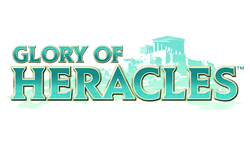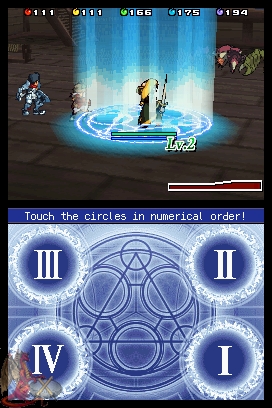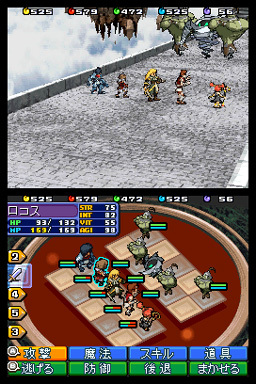|
|

|
PLATFORM
|
DS
|
BATTLE SYSTEM
|

|
INTERACTION
|

|
ORIGINALITY
|

|
STORY
|

|
MUSIC & SOUND
|

|
VISUALS
|

|
CHALLENGE
|
Easy
|
COMPLETION TIME
|
20-40 Hours
|
|
OVERALL

|
+ Solid localization.
+ Great boss fights.
+ Excellent music and visuals.
- Bland dungeon designs.
- Slow combat interface encourages use of auto-battle.
|
Click here for scoring definitions
|
|
|
Greek mythology has been an ongoing interest for me since I was ten years old. In my younger days I even played a MUD set in ancient Greece, based loosely on Kevin Sorbo's popular television series. I doubt I'm alone in this fascination; ancient Greece is one of the richest, most colorful periods of documented human history. It's a world of imperfect Gods, forbidden romances, heroes, adventurers, and all manner of fearsome beasts. In fact, in many ways, modern fantasy owes more to Greek mythology than it does the likes of J.R.R. Tolkien or C.S. Lewis. With so much history and lore to draw on, it's not surprising to find the setting appearing in video games. Glory of Heracles is one such game.
Glory of Heracles tells the tale of five immortal heroes who are trying to figure out who they are and why they cannot die. Their adventures take them all over Greece and even into outlying regions such as Troy, Egypt, and Byblos. Despite the mythological setting, Glory of Heracles is very much a JRPG, and includes many of the clichés that the genre is famous for. However, the localization is particularly well done, and the story itself is put together very well, providing plenty of clever twists while drawing on Greek myths for plot elements. The Fall of Troy, the story of Daedalus and Icarus, the myth of Prometheus, and the defeat of the mighty titan Typhon all play a role in the plot, and it's woven together perfectly. The story does play a little fast and loose with the myths, and not all the details are exactly as they were originally told, but for the most part it's quite faithful to its inspiration while still telling a new, unique story.
The game is a classical JRPG in more ways than one, as the combat and exploration follow the same route. Battles occur randomly and are fought turn by turn. Attacks are selected for each character, and then the round plays out. Likewise, there is a world map with towns and dungeons that can be explored. Treasure chests are scattered everywhere, and plenty of shopping can be found in places of human habitation.
 Touch-screen mini-games are entirely optional, but can greatly boost your damage.
Touch-screen mini-games are entirely optional, but can greatly boost your damage.
|
|
Although it follows a very traditional formula, the combat is actually surprisingly complex. There are three types of skills each character is able to learn — skills, magic, and abilities. Skills are MP-consuming weapon attacks, while magic spells consume both MP and a new resource called ether. Ether comes in five types, and is gained and drained based on skills and spells that are used by the party. Ether is shared among allies and enemies, and if a spell doesn't have enough ether to be cast, it causes recoil damage to the caster. This means that you generally can't always spam your most powerful spells and abilities, and instead need to make use of a wide variety in order to balance your ether. The final type of skill characters can learn are abilities, which are passive skills that activate when certain conditions are met during battle. These can be anything from counterattacks to MP-regeneration.
Unfortunately, combat is not very quick. Selecting attacks for each character can be time-consuming, especially later in the game when you have access to dozens of skills and spells. Luckily, an auto-battle function is available, featuring fairly intelligent AI with some rudimentary customization options. This auto-battle feature is a huge asset, as most normal encounters are incredibly easy and this allows you to breeze through them without tediously selecting attacks and targets for each character. Occasionally the AI can do some stupid things, such as using the skill "Desperation," which deals massive damage but reduces your HP to critical levels, when the character's health is at its maximum. But aside from a few nuisances, auto-battle makes the game a lot more palatable for the most part.
 The auto-battle button speeds fights like this up a great deal.
The auto-battle button speeds fights like this up a great deal.
|
|
Boss fights are where the real fun is to be found. In addition to generally being much more challenging (though still fairly easy), they pretty much demand your full attention, and you can take these times to properly play with the game's combat. When manually selecting attacks, an option exists to boost a skill or spell's damage by performing a simple touchscreen mini-game. There are a wide variety of these mini-games to be discovered, and some skills can more than double in damage.
The complexity of the combat system stands in stark contrast to the design of the dungeons. Although a small handful are fairly interesting, even requiring a bit of thought to navigate, many are simply the same map repeated several times. The final dungeon is just the same staircase repeated for five floors, and it gets old fast. The towns, on the other hand, are all large and unique, particularly those for major cities such as Troy, Sparta, and Athens. Many feature multiple areas, with the town's shops split between them.
Despite being 2D, sprite-based visuals, Glory of Heracles is actually very attractive. Though the environments can often be bland, and the towns all seem to feature the same crop fields and building designs, the sprites are impeccably drawn. They may actually be the most detailed sprites I've seen outside of Vanillaware's console offerings. The animations these sprites perform are also amazingly complex, particularly in battle. They can easily hold their ground against the best DS 3D out there, and many will probably prefer it. The audio is also quite good. The soundtrack is large, and the tunes evoke a 16-bit vibe that should give veteran RPGamers a warm, fuzzy feeling. The battle themes change on a regular basis, preventing the music from getting stale.
All things considered, Glory of Heracles isn't an amazing game, but it has enough charm to satisfy RPGamers looking for a simple, story-driven JRPG. The quest lasts roughly twenty-five hours, and the great boss fights, likable characters, and mythological setting provide plenty of entertainment value. The game is fairly easy, with only a few boss fights likely to give anyone any real trouble. Glory of Heracles isn't going to win any gold medals, but cheer for it anyways. It certainly tries hard.
Review Archives
|









